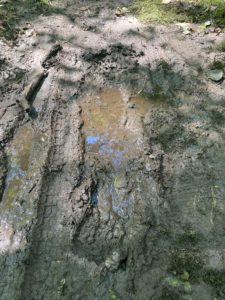By Ariana Zimney, Summer Intern for Woodland Dunes
Mud, Glorious Mud!
One activity that I wish didn’t go out of style for “big kids” is playing in the mud. Mud is wonderful! I recall many times when  my sister and I would spend hours playing in the mud in my backyard, and in turn, drag it back into the house. It’s a great way for children, or people of all ages, to play and learn from.
my sister and I would spend hours playing in the mud in my backyard, and in turn, drag it back into the house. It’s a great way for children, or people of all ages, to play and learn from.
But what is mud? It’s more than just dirt and water mixed into a great substance. It’s a plethora of unique and special ingredients. While water and dirt are the main ingredients, loam and silt, soils composed mostly of sand, regularly end up in your mud creations. These two added ingredients help make the mud stickier and thicker. However, what can you make from some serious mud? Well, plenty! Mud-brick buildings are built around the world and include houses, apartment buildings, mosques, and churches. The Great Pyramid even had parts of it made out of mud for sturdiness and low combustibility.
But, not only do humans use mud, but animals from all over the world use mud for various reasons – besides playing in. Elephants, for example, rub mud on them to regulate their body temperature. The mud acts as protection against sunburn and insects too. Another animal that utilizes mud often is a wasp called the Mud Dauber. This wasp builds its nests out of the mud. And just in case, if you ever find yourself out in the mosquito-filled woods without repellent, rub some mud on you and the bugs should stay away.
Many marine animals and fish use mud to burrow into the muddy seabeds as well. This in turn churns them and allows the exchange and cycling of oxygen, nitrogen, and other minerals to mix between the water and the now upturned sediment. The animals and fish are provided a special habitat and opportunities for feeding on these burrows while the water can receive upturn.
While mud can be beautiful, helpful, and fun it can also be dangerous. Landslides (or mudslides) cause harmful events around the world. These landslides normally occur when water rapidly accumulates in the ground and results in a surge of water-saturated rock, earth, and debris. But with proper precautions, such as strongly rooted vegetation that can help keep loose soil from running down hillsides, these natural occurrences can be avoided or reduced.
So the next time your children, grandchildren, or you go outside to play in the mud, remember just how special this mixture is. It’s full of rich minerals, it’s home and shelter to many animals, and has built cities all around the world. But, perhaps the most exciting part about mud is when it’s time to play outside and get messy!
Photo of mud by author
